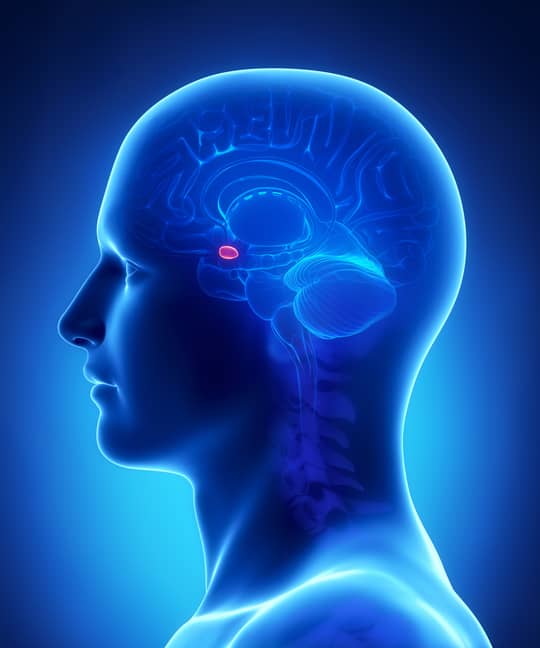What Causes Anxiety in the Brain?

Anxiety is a common mental health condition that affects millions of people worldwide. It can cause a range of physical and emotional symptoms, making it difficult to navigate daily life. But what actually causes anxiety in the brain? To understand anxiety better, it’s important to explore the science behind it. At Mile High Psychiatry, we’re here to break down the neurological causes of anxiety and provide insight into how these processes affect your mental health.
How the Brain Responds to Anxiety
Anxiety is a natural response to stress or danger. It’s part of the body’s “fight or flight” system, designed to protect you in threatening situations. However, for people with anxiety disorders, this response can become overactive, leading to excessive fear and worry even when there’s no real threat. The brain plays a central role in how anxiety manifests, with specific regions, chemicals, and pathways involved.
Here are some key areas of the brain and their role in anxiety:
The Amygdala: The Brain’s Fear Center
The amygdala is a small, almond-shaped structure located deep in the brain’s temporal lobes. It plays a major role in processing emotions, especially fear. The amygdala helps detect danger and triggers the body’s fight-or-flight response, which prepares you to face or escape a potential threat.
In individuals with anxiety, the amygdala can become overactive, even when there’s no immediate danger. This heightened response can lead to feelings of fear, panic, or worry, even in everyday situations. Essentially, the brain perceives non-threatening situations as dangerous, causing the body to remain in a constant state of alertness.

The Prefrontal Cortex: Managing Fear
The prefrontal cortex is responsible for higher-level thinking and decision-making. It helps regulate emotions and assess whether a perceived threat is real or imagined. Normally, the prefrontal cortex works alongside the amygdala to evaluate danger and help calm you down if the situation isn’t truly harmful.
However, in people with anxiety, communication between the amygdala and prefrontal cortex can become imbalanced. This leads to difficulty controlling worry or fear. The prefrontal cortex might struggle to “talk down” the amygdala, which keeps the anxiety response active even when it’s not necessary.

The Hippocampus: Storing Memories
The hippocampus, located near the amygdala, plays a key role in storing and retrieving memories. For individuals with anxiety, particularly those with post-traumatic stress disorder (PTSD), the hippocampus can store distressing memories, making them more likely to resurface when triggered by certain cues or situations.
When the hippocampus stores fearful memories, it may trigger anxiety in the present, even if the original source of fear is no longer relevant. For example, a person who experienced trauma may have their anxiety triggered when they encounter a similar situation or reminder of that trauma, even if there’s no real danger.

Neurotransmitters: Chemical Messengers
The brain uses chemical messengers, known as neurotransmitters, to communicate between nerve cells. Several neurotransmitters are involved in regulating mood and anxiety levels:
- Serotonin: Often referred to as the “feel-good” chemical, serotonin helps regulate mood, sleep, and appetite. Low levels of serotonin are commonly linked to anxiety and depression.
- GABA (Gamma-Aminobutyric Acid): GABA is an inhibitory neurotransmitter, meaning it helps calm brain activity. People with anxiety disorders often have reduced GABA activity, which makes it harder for their brains to relax.
- Norepinephrine: This neurotransmitter plays a role in the body’s response to stress. High levels of norepinephrine can increase feelings of anxiety and contribute to physical symptoms such as a racing heart or trembling.
- Cortisol: While technically a hormone, cortisol plays an important role in the brain’s response to stress. Chronic anxiety often leads to elevated cortisol levels, which can have long-term effects on both mental and physical health.

Genetics and Anxiety
Research suggests that anxiety can be influenced by genetics. If you have a family history of anxiety or other mood disorders, you may be more prone to developing anxiety yourself. Certain genes affect how neurotransmitters like serotonin and GABA function, which can increase your susceptibility to anxiety.
While genetics aren’t the sole cause of anxiety, they can play a significant role in how your brain reacts to stress and fear, making you more sensitive to environmental triggers.
The Role of the Environment
It’s important to note that while brain chemistry and genetics play a role in anxiety, your environment and life experiences can also influence anxiety levels. Stressful events, trauma, or prolonged exposure to stressful environments can rewire the brain, making it more prone to anxiety. Early childhood experiences, such as neglect or abuse, can also shape how the brain processes fear and stress later in life.
How to Manage Anxiety
Understanding the brain’s role in anxiety can help us better manage it. Here are a few ways you can help reduce anxiety and promote healthier brain functioning:
Practice Mindfulness and Meditation
Mindfulness exercises and meditation can help calm the brain’s overactive fear response. By focusing on the present moment and practicing deep breathing, you can reduce the influence of the amygdala and strengthen the prefrontal cortex’s ability to regulate anxiety.
Cognitive Behavioral Therapy (CBT)
Cognitive Behavioral Therapy (CBT) is a highly effective form of therapy that helps individuals identify and challenge negative thought patterns that contribute to anxiety. By changing these thought patterns, you can retrain your brain to respond differently to stress and fear.
Medication
For some individuals, medication can help balance neurotransmitters that play a role in anxiety. Selective serotonin reuptake inhibitors (SSRIs), for example, can increase serotonin levels in the brain, while anti-anxiety medications can enhance GABA activity to promote relaxation. A mental health professional can work with you to determine if medication is the right option for you.
Physical Activity
Exercise is known to boost endorphins, which are natural mood lifters. Physical activity also increases levels of serotonin and norepinephrine, which can help reduce anxiety. Regular exercise is a great way to help regulate both body and brain functions.
How Mile High Psychiatry Can Help
At Mile High Psychiatry, we understand how difficult anxiety can be, and we’re here to help. Our compassionate team of mental health providers can work with you to develop a personalized plan for managing anxiety. Whether through therapy, medication, or a combination of both, we are committed to helping you find relief and feel more in control of your mental health.
Take Control of Your Anxiety Today
Understanding the brain’s role in anxiety is the first step in gaining control over your mental health. If you’re struggling with anxiety, don’t hesitate to seek help. At Mile High Psychiatry, we’re here to support you every step of the way. Contact us today to learn more about our services and how we can help you manage anxiety and lead a healthier, happier life. Together, we can work toward lasting relief.


